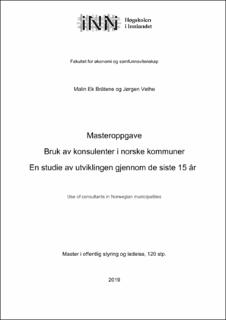| dc.contributor.author | Ek Bråtene, Malin | |
| dc.contributor.author | Vethe, Jørgen | |
| dc.date.accessioned | 2021-04-29T17:57:36Z | |
| dc.date.available | 2021-04-29T17:57:36Z | |
| dc.date.issued | 2019 | |
| dc.identifier.uri | https://hdl.handle.net/11250/2740436 | |
| dc.description | Dybdebasert master 120 stp. | en_US |
| dc.description.abstract | I 2017 kom Riksrevisjonen ut med en rapport som konkluderte med at Staten brukte store ressurser på konsulenter. Mange store, statlige prosjekter involverte konsulenter på ett eller flere plan. Ettersom denne utgiften betales med felleskapets ressurser, ønsker vi å finne ut om også norske kommuner har tilsvarende forbruk av konsulenter. I denne oppgaven undersøker vi to ting. For det første, ønsker vi å undersøke om det har vært en økning i bruk av konsulenter i norske kommuner i de siste femten årene. Deretter, utleder vi tre hypoteser på bakgrunn av teori som kan bidra til å forklare hvorfor en slik økning har funnet sted. I den første analysedelen finner vi klare indikasjoner på at det har vært en tendens til økning I bruk av konsulenter for norske kommuner fra 2003 til 2018. I den andre analysedelen tar vi utgangspunkt i funnene vi gjorde i den første delen av analysen. For å bidra til å forklare denne økningen, vil oppgaven studere relevansen av tre hypoteser basert på instrumentell, institusjonell og ny-institusjonell teori. Først diskuteres det om rasjonell aktør-teori kan forklare en økning i konsulentbruk i norske kommuner. Deretter studerer oppgaven om det kan være andre årsaker som kan bidra til å forklare en økning I konsulentbruk, hvor det vil legges vekt på mekanismene logikken om passende atferd og isomorfisme. Gjennom arbeidet med analysen av våre datakilder, indikerer våre hovedfunn at den økende tendensen i bruk av konsulenter ikke kan forklares fullt ut i et rasjonelt perspektiv. Vi ser at en stadig økende oppgaveportefølje krever at kommunene omstiller seg for å møte de myndighetspålagte kravene som dette medfølger. Samtidig er det et økende krav om spisset kompetanse i samfunnet generelt, og større utfordringer med å sikre nødvendig kompetanse I kommunene. Dette fører til at kommunene velger konsulentbistand for å løse sine oppgaver på en legitim måte. Våre funn indikerer at alle de tre hypotesene gir et godt, dog ikke fullstendig, bilde samlet sett. Spesielt den institusjonelle og den ny-institusjonelle hypotesen gir en indikasjon på hvorfor vi ser en økning i bruk av konsulenter i norske kommuner. | en_US |
| dc.description.abstract | Engelsk sammendrag (abstract)
In 2017, the Office of the Auditor General (OAG) in Norway published a report which concluded that the state level of government used a large amount of resources on consultants. Many large government projects involved the use of consultants on one or more levels. Since the use of consultants is somehow paid for by the community, we wanted to find out whether Norway´s municipalities also have a similar use of consultants. In this master´s thesis, we examine two features. Firstly, we would like to answer whether there has been an increase in the use of consultants in Norway's municipalities in the last fifteen years. Then, we derive three hypotheses based on theory that can help explain why such an increase has occurred. In the second part of the analysis, we make use of the findings we made in the first part of the analysis. To help explain this increase, this thesis will study the relevance of three hypotheses derived from instrumental, institutional and neo-institutional theory. First, the thesis discusses whether rational choice theory can explain an increase in consultancy use in Norwegian municipalities. Next, the thesis studies whether there may be other, non-rational causes, which may help to explain the increase in the consultancy use. Here, the thesis will emphasize on the mechanisms the logic of appropriateness and isomorphism. Through our analysis of our data sources, our main findings indicate that the increasing trend in the use of consultants cannot be fully explained in a rational perspective. We see that an ever-increasing task portfolio requires the municipalities to adapt to meet the government imposed requirements that this entails. At the same time, there is an increasing demand for tailored expertise in society in general, and greater challenges in securing the necessary expertise in the municipalities. This means that the municipalities choose consultancy to legitimately perform their tasks. Our findings indicate that all three hypotheses provide a good, though not complete, picture overall. In particular the institutional and neo-institutional hypotheses give an indication of why we see an increase in the use of consultants in Norwegian municipalities. | en_US |
| dc.language.iso | nob | en_US |
| dc.subject | instrumentell | en_US |
| dc.subject | institusjonell | en_US |
| dc.subject | kvalitativ metode | en_US |
| dc.subject | Qualitative Method | en_US |
| dc.subject | Instrumental | en_US |
| dc.subject | Institutional | en_US |
| dc.title | Bruk av konsulenter i norske kommuner: En studie av utviklingen gjennom de siste 15 år | en_US |
| dc.title.alternative | Use of consultants in Norwegian municipalities Master i offentlig styring og ledelse, 120 stp. 2019 | en_US |
| dc.type | Master thesis | en_US |
| dc.subject.nsi | VDP::Samfunnsvitenskap: 200::Statsvitenskap og organisasjonsteori: 240 | en_US |
| dc.source.pagenumber | 133 | en_US |
